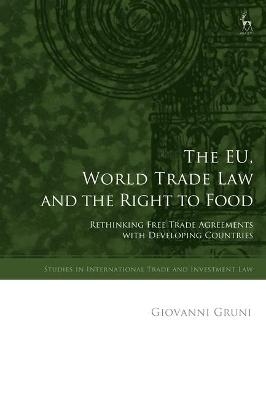
The EU, World Trade Law and the Right to Food
Hart Publishing (Verlag)
978-1-5099-4374-6 (ISBN)
This book looks at the existing WTO law and at the new EU free trade agreements with the Caribbean and sub-Saharan Africa through the lens of the human right to adequate food. It shows how the clauses on the import and export of food included in recent free trade agreements limit the capacity of these countries to implement food security policies and to respect their human rights obligations. This outcome appears to be at odds with international human rights law and dismissive of existing human rights references in EU-founding treaties as well as in treaties between the EU and developing states.
Yet, the book argues against the conception in human rights literature that there is an inflexible agenda encoded in world trade law which is fundamentally conflictual with non-economic interests. The book puts forward the idea that the European Union is perfectly placed to develop a narrative of globalisation considering other areas of public international law when negotiating trade agreements and argues that the EU does have the competences and influence to uphold a role of international leadership in designing a sustainable global trading system. Will the EU be ambitious enough?
A timely contribution to the growing academic literature on the relation between world trade law and international human rights law, this book imagines a central role for the EU in reconciling these two areas of international law.
Giovanni Gruni is a research fellow at ESADE Law School.
1. Introduction
I. Why a Book on Human Rights and International Trade Agreements?
II. Area of Research
III. Objective of the Book
IV. Book Outline
2. The Right to Food in International Law
I. Introduction
II. The Content of the Right to Food
III. State Duties
IV. The Right to Food and the Negotiation of Trade Agreements
V. Defragmenting International Law: Paths of Legal Dialogue between Human Rights and Trade Law and the Role of the EU
VI. Conclusions
3. Realising the Right to Food in the Global Food Market
I. Introduction
II. Market Failures
III. Limits of Development Aid and Domestic Policies
IV. Vulnerable Categories
V. The Role of the European Union
VI. Conclusions
4. The EU External Trade Policy and the EU External Food Security Policy
I. Introduction
II. The Influence of the EU on International Trade Law: Institutional Dimension
III. The EU Trade Strategy
IV. The Right to Food in the External Relations of the EU
V. Food Security in the Negotiations of Free Trade Agreements
VI. Conclusions
5. The Right to Food in the WTO
I. Introduction
II. Import Restrictions
III. Safeguards
IV. The Special Safeguards (SSG)
V. The Enabling Clause, Waivers and Free Trade Agreements
VI. Export Restrictions
VII. Conclusions
6. The EU–CARIFORUM Economic Partnership Agreement
I. Introduction
II. The EU–CARIFORUM Economic Partnership Agreement
III. Import Restrictions
IV. Safeguards
V. Export Restrictions
VI. Conclusions
7. The Economic Partnership Agreements between the EU and Sub-Saharan Africa
I. Introduction
II. The State of Negotiations between the EU and Africa
III. Sub-Saharan Africa’s Economic and Legal Setting
IV. Import Restrictions
V. Safeguards
VI. Export Restrictions
VII. Conclusions
8. Conclusions
I. Introduction
II. Summary of the Main Findings of the First Four Chapters
III. Main Findings of the Case Studies
IV. An EU Trade Policy for Global Food Security
V. The EU, the Right to Food and Developing Countries
| Erscheinungsdatum | 16.01.2021 |
|---|---|
| Reihe/Serie | Studies in International Trade and Investment Law |
| Verlagsort | Oxford |
| Sprache | englisch |
| Maße | 156 x 234 mm |
| Gewicht | 318 g |
| Themenwelt | Recht / Steuern ► EU / Internationales Recht |
| Recht / Steuern ► Öffentliches Recht ► Völkerrecht | |
| ISBN-10 | 1-5099-4374-9 / 1509943749 |
| ISBN-13 | 978-1-5099-4374-6 / 9781509943746 |
| Zustand | Neuware |
| Informationen gemäß Produktsicherheitsverordnung (GPSR) | |
| Haben Sie eine Frage zum Produkt? |
aus dem Bereich


